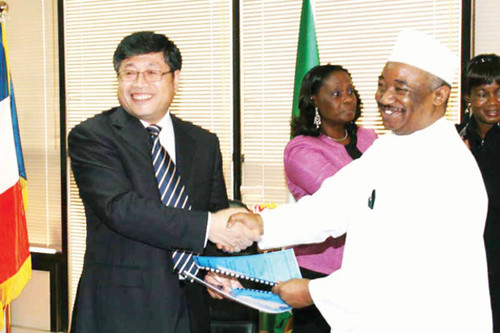
The People's Republic of China and the Federal Republic of Nigeria signed an oil agreement worth at least $23 Billion. The shift in oil policy in the West African state has created friction with Western-based oil firms that have dominated since 1956., a photo by Pan-African News Wire File Photos on Flickr.
Clinton Chastises China on Internet,
African ‘New Colonialism’
By Flavia Krause-Jackson - Jun 11, 2011 U.S.
Secretary of State Hillary Clinton, sharpening her criticism of China, said the world’s second-biggest economy was doing everything to “stifle the Internet” and displaying traits of “new colonialism” in Africa.
Asked today during the recording of a television program in Lusaka, Zambia about whether China was a role model for governance, Clinton answered: “In the long-run, medium-run, even short-run, no I don’t.”
Acknowledging that China, the world’s biggest energy user, has extended its influence across Africa, the top U.S. diplomat said she recognized that while its size accounted for its presence in the continent, she had reservations about its reach.
“We saw that during colonial times, it is easy to come in, take out natural resources, pay off leaders and leave,” Clinton said. “And when you leave, you don’t leave much behind for the people who are there. We don’t want to see a new colonialism in Africa.”
Referring to China, Clinton said “I believe we are beginning to see a lot of problems that you are going to pay more attention to in the next 10 years.” The audience present during the recording clapped when she concluded by saying “young people will not accept to be told what to do.”
Departing Zambia, Clinton landed later in the day in Tanzania for the second leg of a five-day tour in Africa that ends in Ethiopia.
In a sign of the growing importance of sub-Saharan Africa to the U.S., Clinton is the first secretary of state to have visited Zambia, a former British colony, in more than three decades.
First Since Kissinger
The last was Henry Kissinger in 1976, when he called the colonial era in southern Africa a “thing of the past.”
The U.S. is “concerned that China’s foreign assistance and investment practices in Africa have not always been consistent with generally accepted international norms of transparency and good governance,” Clinton said yesterday at a news conference in Lusaka after meeting Zambian President Rupiah Banda.
“Our country has been with a close relationship with China as early as before our independence” in 1964, Banda told reporters. “We work closely with the Chinese, as with any other country that supported our desire to be independent.”
On her Zambian visit, Clinton addressed the failings of the African Growth and Opportunity Act, which gives 37 African countries trade preferences with the U.S. for an array of goods such as textiles. It is primarily used for oil trading, though, doing little to diminish Africa’s reliance on crude as a fuel.
The U.S. Congress will vote on whether to renew the law, which was signed in May 2000 and is set to expire in 2015.
U.S. trade with sub-Saharan Africa still accounts for about 3 percent of total U.S. imports and 1 percent of U.S. exports, a sign that the agreement hasn’t been as successful in fostering more business as the U.S. had hoped. Oil makes up more than 90 percent of the $44 billion generated by U.S. imports from the AGOA countries.
To contact the reporter on this story: Flavia Krause-Jackson in Lusaka, Zambia at fjackson@bloomberg.net
To contact the editor responsible for this story: Mark Silva at msilva34@bloomberg.net
No comments:
Post a Comment